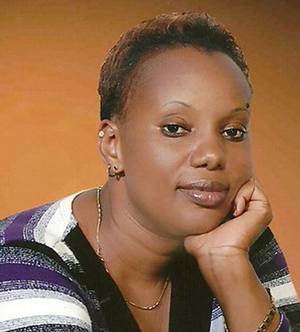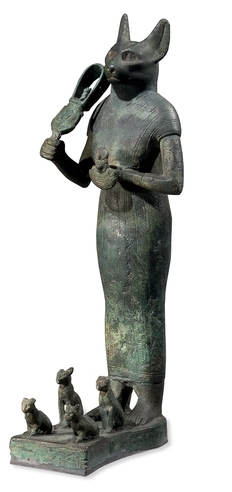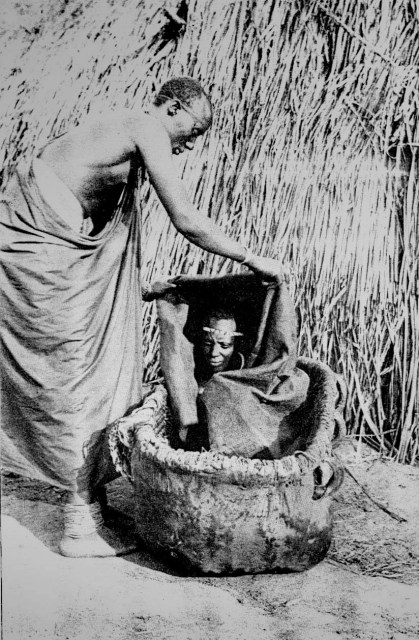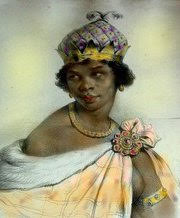I’m a pretty solid woman, I’m from Rwanda, I’m married to a fine sista and I totally exist. But for many Black girls and women like me, knowing that our selves and our stories have a rightful place in Africa and the diaspora is something that isn’t always a given. Understanding ourselves through herstory is something that often has to happen outside of school, and in my case, outside of my birth-family home. It’s been almost ten years since I left high school (and “home”) but it feels like I’m just being introduced to African women who are the mothers of rebellion, womanism and queer power in the world. They are some of our strongest teachers on all matters of survival and they are who I always wanted to be, even before I knew who I wanted to be.
I say that these women saved my life because without them, the Me that I know and love would not be here right now. There’s just something about feeling inauthentic, impossible and insignificant that really makes life a burden, and that’s where I was for years. I was sick of living and wavered between a fear of and desire for death.
I’m better these years; so far so good. I’m still here, I’m Rwandese, I’m queer and these are my mentors:

Naome Ruzindana (from THE INDEPENDENT
Naome Ruzindana, Rwanda
About her:
Naome is a longtime Rwandese activist for LGBTQ rights. She has been active in Rwanda, in Burundi, South Africa and in Uganda (fighting the US-influenced Anti-Homosexuality Bill). She describes her motivation for returning to post-war Rwanda in the early 2000s:
I realised there was a lot that I needed to do, I needed to join activism and I had to be on the ground to lead grass roots activism. I started looking for people who were like me.
In Rwanda, she was an instrumental part of the activism coming from Horizon Community Association and in 2010 she published the first study (that I know of) about the experiences of lesbians in Rwanda. She isn’t in Rwanda lately but HOCA and her legacy are very much alive. Oh, she has an appearance in the film Call Me Kuchu about the 2011 murder of Ugandan LGBT activist and Naome’s close friend, David Kato.
Thoughts:
The first time I heard about HOCA was around 2009, I think I cried. I had been out for several years but I had never met another Rwandese queer women, let alone a fabulous femme activist from the motherland. I sent an email to HOCA’s website administrator and Naome responded. We stumbled through the first couple of emails since my Kinyarwanda and French writing skills were pretty much null, but Naome was patient and added more and more English to our dialogue. Years after that, I read her study and cried, again. I saw the faces and heard the experiences of queers, Rwandese queers, people like me whose existence I had learned to deny because colonialism has forced us colonized folks to erase our own pasts in favor of racist, hetero-cis, dominance-based relationship models.
Takeaway:
Before I met Naome, I struggled with authenticity, I felt alone, I felt like a traitor, I was constantly searching for validation from my peoples and their stories. She gave me all of that, just by talking to me and by giving me opportunities to help support her efforts back home. A few years ago she sent me an email after she was the victim of a terrible attack in retaliation of her work for the LGBT community on the continent. She was calling for donations to help escape out of fear for hers and her loved ones’ lives. I felt guilty for not sending enough, there could never be enough…what price could I ever put on all that this magical pretty fan-girly penpalship. Every now and then, Naome still responds to my email and checks-in, and even when she doesn’t I write to her sometimes just to thank her for helping me exist.

Statue of Bastet
Bastet (Bast, Ubaste), Kemet (modern day Egypt)
About her:
The Goddess Bastet was first worshipped around 3500 BCE and is known as the deity of pleasure and protection. She is also known to have been the pleasure-giver and all around sexier option for goddesses and guy-gods, leading many folks to acknowledge her as a queer Kemetic deity.
Thoughts:
I first came across Bastet when I lived in Atlanta around 2010 when I was invited to a Black led Kemetic belly-dancing workshop at Spelman College. The facilitator turned out to be a scholar of ancient and modern Kemet and she encouraged us to connect with Bastet specifically, as a way to channel our energy for the induction of pleasure. She shared with us ladies how this goddess was here for us queers. To be honest, I don’t remember much about that workshop except my super-excitement about knowing that if anything, queerness has been a special and glorious thing in Africa for millennia.
Take Away:
So, as a Black lady in the south, I have been street-courted by (thirsty) conscious men who just had to share the sentiment that “we were once kings and queens in Africa” and that “a fine African queen deserves a good king”; and that’s where I get to pause and reply (in my head or out loud) that some queens have queens. Bastet gave me that. She gave me a way to honor my love for another Black woman in a context that is free from the antagonism towards thirsty brothers. I have always loved the idea of calling on a deity who knows and incites consensual same-gender passions between beings. I figure she’s why the universe brought me a wife and Black kitty cat, as though in a way, my stereotypical lesbian trajectory is something from the scrolls, and again, my life is saved and preserved.

Muhumusa (seated) circa 1904, Kaigirwa not pictured.
Muhumusa and Kaigirwa, Rwanda/Uganda
About them:
*For context, my dad was born in 1957 and my mom in 1962. My siblings and I are first generation immigrants to Zambia and the US*
Muhumusa died in 1945; she was detained at the time of her death due to her endless fight against German colonialists who later transferred control of Rwanda to the Belgian government. Kaigirwa led several uprisings on central and east African lands, fighting the British and a host of other colonialist troops. She was never captured and is rumored to have retreated to the hills where she and her fellow Nyabingas influenced a series of woes for colonialists and their African conspirators. These two leaders were loyal to Nyabingi, the earth goddess and counterpart to Lyagombe, another central and east African deity.
Thoughts:
When I was 18 I took a class on race and social theory and one of our first assignments was to interview someone about our family [her]stories. I had the best conversation with my dad; he’s always been a good storyteller and lawd did he have a story to tell. Our family looked different before colonialism really set in; we had multiple great-grandmothers across twa, hutu and tutsi households. He told me how my paternal grandmother low-key faked the funk to survive in what was quickly becoming a Christ-dominant nation in the early 20th century. How Lyagombe was a guardian of our home villages and how our offerings were made to honor cycles credited to deities like Lyagombe and Nyabingi. But when I first looked for community around the love for Nyabingi, I came across a big online community of reggae riddim drummers who worshipped Nyabingi. They were mostly men in the west, and mostly not really what I was looking for. Then I came across the priestesses and the few posts and book titles that I found gave me all the life in the universe. These women embodied the spiritual call to fight to self-determination. They were pagan, like me, they loved their homeland, like I do, and they were ready to ride-or-die to let a colonialist know what’s really good in Africa.
Take Away:
Muhumusa once vowed to drive every European out of Africa before any contemporary African president or minister declared Africa for Africans. So as I think about my identity as an Afrocentric African on this earth, I feel Muhumusa. And since learning about her, I feel Kaigirwa in all my trouble-making, I know her as that tick of resistance that boils up in me as I walk through this world as a person who is hated by the powers-that-be. I feel the entire clan when I come together with my fellow QTPOC to organize, party and just kick it. I know that I will survive because fighting oppression is how I have and will continue to survive. Also, did I mention the spells? Because if ever there were spirits to call upon for my weary Rwandese hearts’ wellness, these are them. I fight because they’ve set the tone for what it means to be an African woman.

Nzinga Mbandi via Angolamarket.com
Nzinga Mbandi (Ana de Sousa), Angola
About her:
Nzinga Mbandi was known to be a fearless African queen and ruler who resisted for her lands and people through the 17th century. Born in 1580 in the Ndongo and Matamba region, Nzinga was instrumental in fighting Portuguese colonialists and sponsoring her people’s continued battles for freedom. Like other African leaders at the time, Nzinga knew that colonialism would only breed destruction and she lived her life to combat this eventual end. Her methods were diverse, she fought them on the field and in the market, and by the 1620s her kingdom still rivaled the illegal Portuguese colony in economic power and cultural influence. Towards the end of that decade, however, Nzinga began losing power and was forced to flee as more wars broke out between hers and the colonialist territory. It is rumored that the Portuguese government recognized and respected her status as a local heroine at the time of her death in 1661, but then again, colonialists lie.
Thoughts:
My wife and I came across stories about Nzinga Mbandi in 2014 while doing research about Black women who led revolts against slavery and colonialism, which we later presented at a labor event in Dallas, Texas. Nzinga was a figure who brought so much realness to our understandings of leadership and royalty. Unlike the lavish and elite ideas of leadership that all the damn Marie Antoinette movies have tried to put on women who happen to be royals, Nzinga demonstrated a style of leadership that was based on the love for and preservation of land, culture and the acknowledgement of matriarchy (and no, that’s not sexist).
Take Away:
We are all Nzinga. Like for real, we are all Nzinga nowadays; we move in between our literal fights against a heavily-policed system of white supremacy and our attempts to bargain for better lives within the confines of this struggle situation. For instance, I work for a labor union because unions aim to build power for working people in a capitalist society, but at the same time I am sickened by capitalism and anything that contributes to its preservation. In some ways, Nzinga Mbandi represents the bridge-making that many activists and organizers of color have to partake in in order to draw resources into our communities and our struggles. She never stopped resisting and more importantly, she knew when to fight and she knew that the fight was going to look different every single time. Nzinga Mbandi is a lesson that I am working to learn and own every day. She gives me hope for a long lifetime marked by endless resistance and unwavering determination for the achievement of Black power, women power and power to all my people.

This is a fantastic piece. Thank you for introducing me to these women!
Thanks for reading!
Damn, this was so uplifting and educational. I’m glad we’re friends, Josiane.
Haa and yeah- colonialists lie.
Seriously! Glad we’re friends too!
hell yes. this makes me want to go deep and find stories on bad ass mestizas
Please do!!!
do it!!! dope as femmes of color make my world go round!
Wow, this was great.
Especially: “It is rumored that the Portuguese government recognized and respected her status as a local heroine at the time of her death in 1661, but then again, colonialists lie.”
Many thanks!
Hi. Thanks for the great read.
This is a question for the author and anyone else with insights to share.
You mentioned: “There’s just something about feeling inauthentic, impossible and insignificant that really makes life a burden, and that’s where I was for years.”
I find that this is where I am at now. How did you move past/through this?
Many thanks again for sharing your story. It is a source of strength and hope for me and exactly what I needed today. I am grateful for you sharing and for this space to share within.
Thank you.
Hi M,
Thanks so much for this, I wanna share more about my process later keeping in mind that everyone moves differently. also you are so totally real and valid!
Awesome read to learn about these great ladies! Thank you.
Oh, I loved this. Thank you for introducing us to these amazing women (including you!).
You. You must have known that I had found myself in an Internet blackhole exploring other out young African writers out there this evening.That’s why you wrote this, right? It must be. Even if it’s not, it’s a welcome addition to my reading and a perfect capstone for the night- a reminder of all the bad ass African women I am descended from.
I too often find myself in that same hole. LOL
Wow, this is a fascinating and compelling list. I will definitely be researching more about all of them. Thank you for sharing your story!
This is my first ever comment and it is due to the fact that the writer is someone close to home (I’m Kenyan). Ever since I stumbled onto this website, I’ve been a fan but this is just brilliant. Thank you Josiane for writing this because its hard to find queer people to refer to when everyone is saying that “being gay is unAfrican”. A thing that was drilled into us by colonialism happened, and the colonialists left us with their laws. With this list I can be able to say that that there were strong African women. Queer or not. Autostraddle, thank you once again for making my day :)
I was born in Nairobi! Hi neighbor LOL thanks for you comment :)
This is a nice article. Its difficult to find African voices on LGBT issues which is something every African lgbt person craves. I don’t know about others but I love reading about lgbt issues from all over the world but when its an African story/op ed it hits close to home. I love my country so much (Nigeria) but i know I will never be able to live there openly and happily with my other half until African leaders come to their senses and change those laws. Meanwhile I’m on self imposed exile here in the U.K. Btw, i love autostraddle. (p.s. Some of us African women don’t see ourselves as ‘black’ because it brings to our mind African Americans. Just thought it was worth mentioning, hope no one is offended by this)
I feel you, sis. It’s hard having to leave home because people have forgotten how diverse our sexual history is in Africa.
Hello Josiane!
I am so much humbled and honoured to read this !Thank and we please continue to keep in close contact.
God bless
Thank you!!!! You are wonderful
This is so great and interesting, thank you.
This is my first comment because hello my African Sisters!!!!!! I am from Uganda (currently in the US for school). I loved this, I knew of Nyabingi and Nzinga from history classes in secondary school but never about their queerness. I’m definitely going to start doing more digging about the great queer women in African herstory.
I am seriously dreading the return home because of all the LGBT hating but hey, someone has to do the work of changing things. And frankly I’d rather deal with the homophobia in Uganda where, as a femme, I can sometimes pass as straight, than the racism here in the USA that I can’t ever avoid as a dark skinned African woman. Blackness is too traumatising for me! I don’t know how our African American sisters have handled it for so long but I honestly don’t have the strength that they have.
I love when there are posts about African LGBT people on here because it brings out all the Africans! <3 Sierra Leonian here (too lazy to sign in) and thank you for this post.
This is a fantastic piece. Thank you for introducing me to these women!